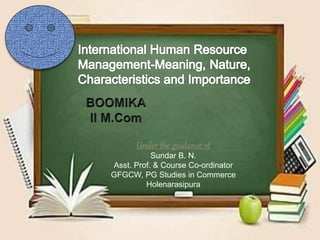
International Human Resource Management - Meaning, Nature, characteristics and Importance
- 1. Under the guidance of Sundar B. N. Asst. Prof. & Course Co-ordinator GFGCW, PG Studies in Commerce Holenarasipura
- 2. International Human Resource management(IHRM) is a process of processing ,allocating and effectively utilizing human resource in multinational corporation, while balancing the integration and differentiation of human resource activities in foreign locations.
- 3. IHRM is a process of procuring international business, motivate, retain and effectively utilize services of people both at the corporate office and at the foreign plants or locations. DEFINITION OF IHRM P. Subba Rao defines IHRM as performing HRM and its related activities and arranging for related and necessary immigration facilities for prospective and current expatriate employees, by organisations operating in domestic and foreign countries.
- 4. The advent of liberalisation, globalisation and advancement of IT has transferred world around us. IT has brought to centric stage the importance of HRM more than ever before. So as nature of IHRM like. 1. The purpose of IHRM enables appropriate deployment of HR worldwide. 2. The quality culture exchange can maintain and satisfy the customer in global level .
- 5. 3. It creates effective utilisation of HR in an competitive 4. It increase the primary task of identify recruit and channel competent operations for improving productivity and functional efficiency 5. It creates opportunity to establish trade blocks to speed up HR activities. 6. Expanding the role of WTO. 7. Business environment becomes global business environment. 8.The orientation assumes greater relevance to increase the interlink across the nations.
- 6. More HR activities Need for broader perspective Involvement in employee More of expartriates Changes in emphasis Risk exposure External influnces
- 7. a) human resource planning Difficulty in implementing H R in host countries Development opportunities for international managers. b) Employee Hiring Ability to mix with oganisations culture Ethnocentric, polycentric or geocentric, staffing approach. Selection of expatriates Managing repatriation process.
- 9. Pay issues Different countries, different currencies. Gender based pay in Korea, Japan, Indonesia Health insurance for employees & their families overtime working – Korean & Japanese firms promotions based on seniority or merit.
- 10. More involvement for both parent- country & third- country nationals Housing arrangements. Health Care Remuneration packages Assist children left behind in boarding schools
- 11. Need for parent country & third- country Nationals decrease as more trained locals become available. Resources reallocated to selection, training & management development .
- 13. Dealing with ministers, political figures, economic & social interest groups. Hiring procedures dictated by host country Catch up- with local ways of doing business.
- 14. Changes in management practices related to IHRM more emphasis has been given to IHRM management because of the following factors; emphasis on core company Reorganization competition for resources. Technological changes. Need for work force empowerment
